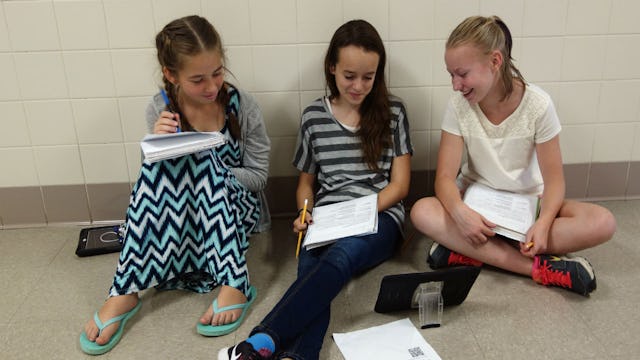Raising My Daughter To Be Kind In A World Of Mean Girls

I don’t really believe in regrets or beating ourselves up for things we did in the past, especially when we were naive kids just trying to figure out our place in this unstable world. However, I do believe we should see our past mistakes as opportunities for learning, growth, and the chance to do better through our children. As a girl who wasn’t cruel, but who didn’t stand up against those who were, I hope to raise my kids to do better, and be braver, than I was.
I was a good girl. Like annoyingly good. I can remember clear as day getting reprimanded by my first grade teacher for turning around to help Cindy, who sat behind me, with her math. I got yelled at for talking, even though I was just trying to help my friend. The burning shame of getting in trouble with my teacher—from falling off my pedestal of perfection for even a minute—stays with me until this day.
Throughout my childhood, I did my homework, stayed out of trouble, and followed the rules. But unfortunately, that’s not all I followed. Because there’s more to being a good human than being the teacher’s pet. When you also follow the alpha girl or boy, and do what they tell you to do, even if it’s unkind, you’re not really that “good” of a girl after all.
And that’s who I was.
Part of being a perfectionist is wanting all facets of your life to be perfect—even your social life and social standing among your peers. Don’t rock the boat. Know your place in the hierarchy. Know what to wear, when to laugh, and who to sit with at lunch. And yes, I followed these rules too.
Including the ones that dictated who we welcomed into our circle of friends. And who we ostracized.
Although I wasn’t ever the ring-leader who outwardly mistreated another girl, I was not much better. I often stood by, watching my peers pick on those who were poor and had stained clothes or dirty hair. I didn’t intervene when the mean girls snickered and pointed and giggled at what Maria or Jennifer was wearing. All I cared about was ensuring that I was never on the other end of that poking stick.
And while I don’t believe in living a life of shameful regret, or beating myself up for the stupid things I did at 10, 11, and 12 years old, I do believe I can make it right in some way. Through my kids.
Now, as a parent, I ask my kids regularly, almost daily, the following questions: I ask them if other kids are kind to them. I also ask them if they are kind to others. I talk about what kindness looks like. And I also ask if everyone in their class has a friend. I talk to my kids about loneliness, and try to get them to imagine the feeling of having no one to play with, no one to laugh with, no one to share their toys or silly stories with. We discuss how valuable friendship is to our soul, and try to imagine what it must be like for those who live their days without friends.
It helps us parents that schools today implement more kindness initiatives than in years past. My children’s school—the entire school—is currently reading Wonder. Our kids have weekly assignments related to the book and to kindness, and there is an all-school event in a few weeks to culminate this unit.
And my children’s previous school was a leadership school, meaning their day-to-day activities and lessons were tied back to what being a leader means—standing up to a bully, doing the right thing, following the rules, being safe, helping others. So I already have an arsenal in my back pocket to pull from, as I work kindness into my parenting, and I’m grateful for that.
But it’s not enough if we’re merely teaching them to “not bully others.” It’s crucial that when we talk to our kids about this topic, we teach them to be upstanders. As explained on The Bully Project, “An ‘upstander’ is someone who recognizes when something is wrong and acts to make it right. When an upstander sees or hears about someone being bullied, they speak up. Being an upstander is being a hero: we are standing up for what is right and doing our best to help support and protect someone who is being hurt. In many ways, this is another word for being socially responsible.”
The hard truth is, being a bystander is not much different from being a participant. Being a bystander takes no bravery. No leadership. It’s when kids leave the circle, even if it means going out on their own, to say hello to a lonely child at recess who has no one—those are the heroic kids who make a difference.
It takes courage to be an upstander, courage that maybe I didn’t have as a kid. And I am not guaranteeing that my kids have it, as that’s not something you can teach. But I guess the best I can do is talk to them about what it truly means to be a “good kid” — a boldly kind kid — in today’s world.
This article was originally published on